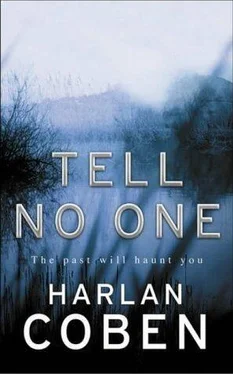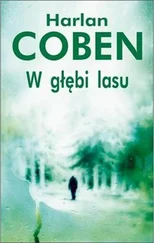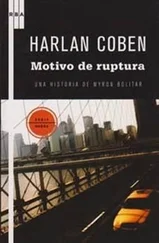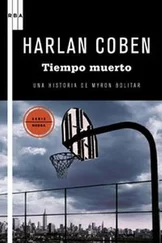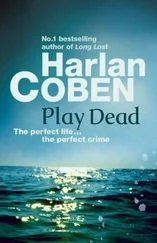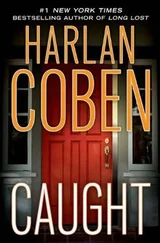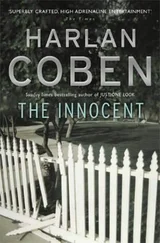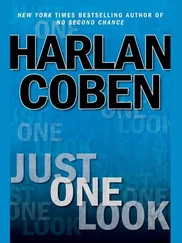Hearing me, the nurse hurried off the phone and hightailed it into the room with a bright smile. I didn't return it.
I eyed the basement door. I was still delaying the inevitable.
No more stalling.
"Stay with him," I said.
The nurse bowed her head and sat down.
The basement had been finished in the days before people finished basements, and it showed. The once-brown shag carpet was pockmarked and water-buckled. Faux white brick made from some sort of bizarre synthetic had been glued to asphalt walls. Some sheets had fallen to the shag; others stopped mid-topple, like columns of the Acropolis.
In the center of the room, the Ping-Pong table's green had been washed to an almost in-vogue spearmint. The torn net looked like the barricades after the French troops stormed. The paddles were stripped down to the splintery wood.
Some cardboard boxes, many sprouting mold, sat on top of the Ping-Pong table. Others were piled in the corner. Old clothes were in wardrobe boxes. Not Elizabeth's. Shauna and Linda had cleared those out for me. Goodwill got them, I think. But some of the other boxes held old items. Her items. I couldn't throw them away, and I couldn't let other people have them. I'm not sure why. Some things we pack away, stick in the back of the closet, never expect to see again – but we can't quite make ourselves discard them. Like dreams, I guess.
I wasn't sure where I had put it, but I knew it was there. I started going through old photographs, once again averting my gaze. I was pretty good at that, though as time went on, the photographs hurt less and less. When I saw Elizabeth and me together in some greening Polaroid, it was as though I were looking at strangers.
I hated doing this.
I dug deeper into the box. My fingertips hit something made of felt, and I pulled out her tennis varsity letter from high school. With a sad smirk, I remembered her tan legs and the way her braid bounced as she hopped toward the net. On the court, her face was locked in pure concentration. That was how Elizabeth would beat you. She had decent enough ground strokes and a pretty good serve, but what lifted her above her classmates was that focus.
I put the letter down gingerly and started digging again. I found what I was looking for at the bottom.
Her daily planner.
The police had wanted it after the abduction. Or so I was told. Rebecca came by the apartment and helped them find it. I assume they searched for clues in it – the same thing I was about to do-but when the body popped up with the K branding, they probably stopped.
I thought about that some more – about how everything had been neatly pinned on KillRoy – and another thought scurried through my brain. I ran upstairs to my computer and got online. I found the Web site for the New York City Department of Correction. Tons of stuff on it, including the name and phone number I needed.
I signed off and called Briggs Penitentiary.
That's the prison that holds KillRoy
When the recording came on, I pressed in the proper extension and was put through. Three rings later, a man said, "Deputy Superintendent Brown speaking."
I told him that I wanted to visit Elroy Kellerton.
"And you are?" he said.
"Dr. David Beck. My wife, Elizabeth Beck, was one of his victims.
"I see." Brown hesitated. "May I ask the purpose of your visit?"
"No."
There was more silence on the line.
"I have the right to visit him if he's willing to see me," I said.
"Yes, of course, but this is a highly unusual request."
"I'm still making it."
"The normal procedure is to have your attorney go through his-"
"But I don't have to," I interrupted. I learned this at a victim's rights Web site – that I could make the request myself. If Kellerton was willing to see me, I was in. "I just want to talk to Kellerton. You have visiting hours tomorrow, don't you?"
"Yes, we do."
"Then if Kellerton agrees, I'll be up tomorrow. Is there a problem with that?"
"No, sir. If he agrees, there's no problem."
I thanked him and hung up the phone. I was taking action. It felt damn good.
The day planner sat on the desk next to me. I was avoiding it again, because as painful as a photograph or recording might be, handwriting was somehow worse, somehow more personal. Elizabeth's soaring capital letters, the firmly crossed ts, the too many loops between letters, the way it all tilted to the right…
I spent an hour going through it. Elizabeth was detailed. She didn't shorthand much. What surprised me was how well I'd known my wife. Everything was clear, and there were no surprises. In fact, there was only one appointment I couldn't account for.
Three weeks before her death, there was an entry that read simply: PF .
And a phone number without an area code.
In light of how specific she'd been elsewhere, I found this entry a little unsettling. I didn't have a clue what the area code would be. The call was made eight years ago. Area codes had split and changed several different ways since then.
I tried 201 and got a disconnect. I tried 973. An old lady answered. I told her she'd won a free subscription to the New York Post. She gave me her name. Neither initial matched. I tried 212, which was the city. And that was where I hit bingo.
"Peter Flannery, attorney at law," a woman said mid-yawn.
"May I speak to Mr. Flannery, please."
"He's in court."
She could have sounded more bored but not without a quality prescription. I heard a lot of noise in the background.
"I'd like to make an appointment to see Mr. Flannery."
"You answering the billboard ad?"
"Billboard ad?"
"You injured?"
"Yes," I said. "But I didn't see an ad. A friend recommended him. It's a medical malpractice case. I came in with a broken arm and now I can't move it. I lost my job. The pain is nonstop."
She set me up for an appointment tomorrow afternoon.
I put the phone back into the cradle and frowned. What would Elizabeth be doing with a probable ambulance-chaser like Flannery?
The sound of the phone made me jump. I snatched it up mid ring.
"Hello," I said.
It was Shauna. "Where are you?" she asked.
"Home."
"You need to get over here right away," she said.
Agent Carlson looked Hoyt Parker straight in the eye. "As you know, we recently found two bodies in the vicinity of Lake Charmaine."
Hoyt nodded.
A cell phone chirped. Stone managed to hoist himself up and said "Excuse me" before lumbering into the kitchen. Hoyt turned back to Carlson and waited.
"We know the official account of your daughter's death," Carlson said. "She and her husband, David Beck, visited the lake for an annual ritual. They went swimming in the dark. KillRoy lay in wait. He assaulted Dr. Beck and kidnapped your daughter. End of story."
"And you don't think that's what happened?"
"No, Hoyt – can I call you Hoyt?"
Hoyt nodded.
"No, Hoyt, we don't."
"So how do you see it?"
"I think David Beck murdered your daughter and pinned it on a serial killer."
Hoyt, a twenty-eight-year veteran of the NYPD, knew how to keep a straight face, but he still leaned back as though the words were jabs at his chin. "Let's hear it."
"Okay, let's start from the beginning. Beck takes your daughter up to a secluded lake, right?"
"Right."
"You've been there?"
"Many times."
"Oh?"
"We were all friends. Kim and I were close to David's parents. We used to visit all the time."
"Then you know how secluded it is."
"Yes."
"Dirt road, a sign that you'd only see if you knew to look for it. It's as hidden as hidden can be. No signs of life."
"What's your point?"
Читать дальше
